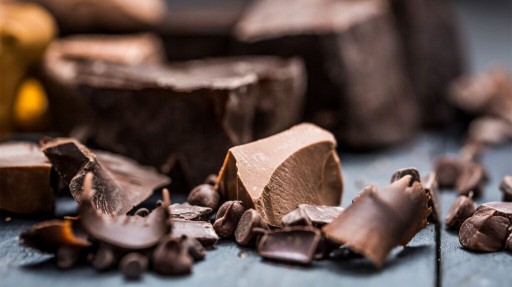Hypertension: Eating dark chocolate may help reduce risk

- Essential hypertension is high blood pressure that doesn’t have a known cause.
- Dark chocolate is a popular food item that may offer valuable health benefits.
- A Mendelian randomization study found that intake of dark chocolate was associated with a decreased risk for essential hypertension and possibly a reduced risk for blood clots.
High blood pressure can be dangerous to cardiovascular health. Prevention and management of high blood pressure can help ensure many positive health outcomes but researchers are still seeking to understand the best methods for preventing high blood pressure.
A recent
The results also suggest that consuming dark chocolate may decrease blood clot risk, but researchers couldn’t establish a causal relationship.
The results point to the potential benefits of this food and the need for future research into its potential health benefits.
The dangers of hypertension and the benefits of dark chocolate
“Essential hypertension is a highly prevalent medical condition characterized by elevated blood pressure levels without an apparent underlying cause. It is by far the most common cause of hypertension globally. Essential hypertension stands out as the predominant contributor to cardiovascular diseases, including coronary artery disease, heart failure, and stroke.”
High blood pressure can be managed through lifestyle changes and certain medications. However, people can often take action to
However, researchers are also looking at how eating specific foods may assist with high blood pressure prevention. Research like this could lead to people making more specific healthy food choices.
Dark chocolate is one food with many potential health benefits that researchers are interested in studying. Non-study author and registered dietitian nutritionist Karen Z. Berg explained to Medical News Today:
“For chocolate to be considered ‘dark chocolate’ it has to contain at least 50% cocoa solids, and many dark chocolate is made up of 70% or even 90% cocoa which leaves a lot less room for other additives like sugar. This is why dark chocolate tends to be more bitter than milk chocolate varieties.”
“Cocoa is rich in flavanols, so the higher the percentage of cocoa in your chocolate, the more health benefits are possible. [D]ark chocolate is also a good source of fiber, iron, magnesium, phosphorus and zinc. It is important to note that to get the most benefits, you want to choose more natural forms of cocoa. It is also important to note that the higher the percentage of cocoa you have, the more caffeine it will contain.”
— Karen Z. Berg
How dark chocolate lowers essential hypertension risk
Researchers wanted to understand more about how dark chocolate may help lower the risk for several cardiovascular diseases. One way researchers can look into possible causality as well is to use a technique called
This method involves looking at genetic differences to provide evidence that a particular intervention has a causal effect and helps eliminate the risk of reverse causation. While not perfect proof, it allows for safety and data collection that isn’t always possible with other studies due to ethical concerns.
Researchers of this study were able to use data from publicly available genome-wide association studies. They looked at dark chocolate intake and risk for several cardiovascular diseases, including essential hypertension, coronary heart disease, heart failure, stroke, blood clots beginning in the veins, and heart attack.
The analysis results were promising for the positives of dark chocolate intake. Researchers found that genetically predicted dark chocolate intake may help lower the risk for essential hypertension. The data further points to a possible causal relationship between dark chocolate intake and decreased risk for essential hypertension.
They also found a possible association between dark chocolate intake and a reduced risk for
Chocolate-derived treatments for hypertension?
Dr. Tadwalkar noted that the results held promise despite the study’s limitations.
“The study’s findings hold significant promise for the prevention of essential hypertension. If future research confirms the causal relationship, it could pave the way for not only dietary recommendations but also dark chocolate-derived bioactive compounds or extracts in the development of novel therapies for the prevention or management of essential hypertension. Ultimately, the study offers exciting possibilities for the future of essential hypertension prevention,” he explained to Medical News Today.
The researchers did not find any associations between dark chocolate intake and other cardiovascular diseases.
“Of the diseases studied, dark chocolate intake was specifically associated with reduced risk of hypertension, but not any other conditions. While this is a notable finding, its clinical implication is limited.”
“The clinical cardiovascular concern for hypertension would be on its potential impact on rates of resultant conditions such as heart attack and stroke, but no other associations between dark chocolate intake and other cardiovascular conditions were identified. I wouldn’t discourage dark chocolate intake based on this study, but I also wouldn’t recommend increasing dark chocolate intake based on this study alone,” Dr. Chen added.
Will eating more chocolate improve my heart health?
This research also presents particular challenges and limitations.
First, the sample size exposure data was small, which may have impacted the results. Second, they lost some of the single nucleotide polymorphisms summary-level data for stroke and heart failure, which could have affected the results. The research also utilized data from European ancestry, meaning the results cannot be generalized to other populations.
Their research did not allow for certain analyses, such as looking at the amount of dark chocolate intake or the risk for cardiovascular diseases based on factors like age or gender. There was also some potential bias because of sample overlap. Finally, there may have been some risk of confounding regarding coronary heart disease data.
Overall, the results point to the potential benefits of dark chocolate for preventing essential hypertension. It also opens the door for future research in this area.
Dr. Tadwalkar noted the following:
“Several exciting research avenues remain open in the wake of studies like this one. Next steps include unraveling the precise mechanisms by which dark chocolate consumption influences cardiovascular health. This could involve utilizing advanced genetic techniques to understand how dark chocolate intake might influence gene expression patterns relevant to cardiovascular health.”
“Also, further research could delve into the potential impact of dark chocolate on other cardiovascular endpoints, such as atherosclerotic plaque formation and progression, cardiac function and remodeling, as well as blood clotting and fibrinolysis,” he added.



:max_bytes(150000):strip_icc()/GettyImages-1807240274-2c7c39cb23f34a97bb2d8620911c343d.jpg)
:max_bytes(150000):strip_icc()/Health-GettyImages-1393991928-6eeadfb8e68b43a6b36aba58cc85d4d9.jpg)



